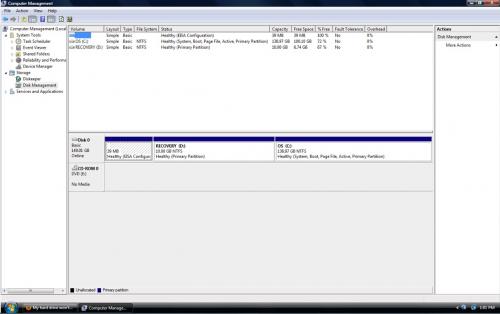I've always felt the way that you do about defragmenting, but my brother thinks I am an idiot. Since it was the only one to show good results after defragging, Diskeeper 2010 is probably a "keeper" (for $39.95). Since all of this defragging business started due to a keyboard and video "lag" problem (which most people seem to think is caused by a "spike" in CPU usage and not enough
RAM), he also thinks that Diskeeper is too much of a CPU "hog" (it will also defrag in the background, if wanted).
I got the following results using the Windows Error Checker earlier today, and chkdsk on C showed the following (which had to be done on a reboot), and D seemed okay.
The C results from that check are below. Is this same as the kind of chkdsk
you wanted me to run, or is it not as complete?
Thanks!
Log Name: Application
Source: Microsoft-Windows-Wininit
Date: 1/16/2010 1:36:25 PM
Event ID: 1001
Task Category: None
Level: Information
Keywords: Classic
User: N/A
Computer: Marshall-PC
Description:
Checking file system on C:
The type of the file system is NTFS.
Volume label is OS.
A disk check has been scheduled.
Windows will now check the disk.
119744 file records processed.
712 large file records processed.
0 bad file records processed.
0 EA records processed.
57 reparse records processed.
161816 index entries processed.
0 unindexed files processed.
119744 security descriptors processed.
Cleaning up 274 unused index entries from index $SII of file 0x9.
Cleaning up 274 unused index entries from index $SDH of file 0x9.
Cleaning up 274 unused security descriptors.
21037 data files processed.
CHKDSK is verifying Usn Journal...
34334104 USN bytes processed.
Usn Journal verification completed.
CHKDSK discovered free space marked as allocated in the
master file table (MFT) bitmap.
CHKDSK discovered free space marked as allocated in the volume bitmap.
Windows has made corrections to the file system.
145721343 KB total disk space.
40422804 KB in 94771 files.
54864 KB in 21038 indexes.
0 KB in bad sectors.
230575 KB in use by the system.
65536 KB occupied by the log file.
105013100 KB available on disk.
4096 bytes in each allocation unit.
36430335 total allocation units on disk.
26253275 allocation units available on disk.
Internal Info:
c0 d3 01 00 6c c4 01 00 ac 1e 03 00 00 00 00 00 ....l...........
85 01 00 00 39 00 00 00 00 00 00 00 00 00 00 00 ....9...........
42 00 00 00 12 75 40 77 a8 85 25 00 a8 7d 25 00 B....u@w..%..}%.
Windows has finished checking your disk.
Please wait while your computer restarts.
Event Xml:
<Event xmlns="
http://schemas.micro.../events/event"> <System>
<Provider Name="Microsoft-Windows-Wininit" Guid="{206f6dea-d3c5-4d10-bc72-989f03c8b84b}" EventSourceName="Wininit" />
<EventID Qualifiers="16384">1001</EventID>
<Version>0</Version>
<Level>4</Level>
<Task>0</Task>
<Opcode>0</Opcode>
<Keywords>0x80000000000000</Keywords>
<TimeCreated SystemTime="2010-01-16T21:36:25.000Z" />
<EventRecordID>65924</EventRecordID>
<Correlation />
<Execution ProcessID="0" ThreadID="0" />
<Channel>Application</Channel>
<Computer>Marshall-PC</Computer>
<Security />
</System>
<EventData>
<Data>
Checking file system on C:
The type of the file system is NTFS.
Volume label is OS.
A disk check has been scheduled.
Windows will now check the disk.
119744 file records processed.
712 large file records processed.
0 bad file records processed.
0 EA records processed.
57 reparse records processed.
161816 index entries processed.
0 unindexed files processed.
119744 security descriptors processed.
Cleaning up 274 unused index entries from index $SII of file 0x9.
Cleaning up 274 unused index entries from index $SDH of file 0x9.
Cleaning up 274 unused security descriptors.
21037 data files processed.
CHKDSK is verifying Usn Journal...
34334104 USN bytes processed.
Usn Journal verification completed.
CHKDSK discovered free space marked as allocated in the
master file table (MFT) bitmap.
CHKDSK discovered free space marked as allocated in the volume bitmap.
Windows has made corrections to the file system.
145721343 KB total disk space.
40422804 KB in 94771 files.
54864 KB in 21038 indexes.
0 KB in bad sectors.
230575 KB in use by the system.
65536 KB occupied by the log file.
105013100 KB available on disk.
4096 bytes in each allocation unit.
36430335 total allocation units on disk.
26253275 allocation units available on disk.
Internal Info:
c0 d3 01 00 6c c4 01 00 ac 1e 03 00 00 00 00 00 ....l...........
85 01 00 00 39 00 00 00 00 00 00 00 00 00 00 00 ....9...........
42 00 00 00 12 75 40 77 a8 85 25 00 a8 7d 25 00 B....u@w..%..}%.
Windows has finished checking your disk.
Please wait while your computer restarts.
</Data>
</EventData>
</Event>
Edited by MarshallO, 16 January 2010 - 05:17 PM.
















 Sign In
Sign In Create Account
Create Account

